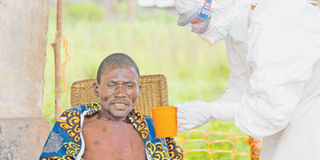Government calls on people to be alert on Ebola

A 43-year-old patient who has been confirmed to have Ebola is comforted by Dr Hilde Declerck of Médecins Sans Frontières Belgium at an isolation ward In Kampungu at Luebo in DR Congo. PHOTO | AF
What you need to know:
- The spokesperson for the Ministry of Health, Community Development, Gender, Elderly and Children, Mr Nsachris Mwamwaja told The Citizen yesterday that the governmetn has already taken action, including enforcing screening at the ports of entry to ensure that no infected persons are allowed into the country.
Dar es Salaam. The government has called on the people to remain vigilant as reports of ne Ebola outbreak emerged on Friday in the Democratic Republic of Congo (DR Congo).
The spokesperson for the Ministry of Health, Community Development, Gender, Elderly and Children, Mr Nsachris Mwamwaja told The Citizen yesterday that the governmetn has already taken action, including enforcing screening at the ports of entry to ensure that no infected persons are allowed into the country.
Tanzania has never registered any case of Ebola in history. He insisted that people must bear in mind that Tanzania was not immune to a possible Ebola outbreak despite the fact that the latest cases of the disease have been reported far away in the DR Congo, at the border with the Central African Republic (CAR).
A World Health Organisation (WHO) official, Eugene Kabambi, told The Citizen on Sunday through yesterday that the DR Congo outbreak has occurred in a very remote and forested village in Lower Uele (Bas Uele) Province.
“Strong measures have been taken to control the outbreak by the DRC government with the WHO and other partners’ support,” said Mr Kabambi who serves as WHO’s Emergency Communications Officer.
An earlier report issued by the same WHO shows that three people have been confirmed dead and six others are suspected of being infected with the virus in what is said to be Congo’s 8th outbreak of Ebola since the virus was first identified near Ebola River in the same country in 1976.
According to Tanzania’s health ministry spokesperson, the government was watching closely as reports of the outbreak continue to unfold.
“We’re doing all we can to maintain safety [of the people] in the country. All ports of entry into Tanzania are always well-equipped with systems to detect any possible cross-border transmission,’’ said Mr Mwamwaja.
He added; “There is need to keep reminding the public on how to keep away from Ebola and when to report any possible case of the disease. We will issue out details on this. We know now that Ebola has been reported in a neighbouring country but this also means that we, as a country, must always be vigilant.”
Ebola is fatal in about 90 per cent of cases and is easily spread between humans through direct contact. The virus can be spread to others through direct contact with blood or body fluids from a person who is sick with or has died from Ebola or when touching objects smeared with blood or body fluds of a sick person.
In 2005 Tanzania signed a legally-binding International Health Regulations (IHR) which directs countries around the world to deal with global health emergencies, such as Ebola that endanger people’s lives and put international traffic as well as trade at risk.
The world’s worst Ebola outbreak occurred in West Africa in 2013 – killing more than 11,300 people and infecting an estimated 28,600 as it swept through Liberia, Guinea and Sierra Leone.
The latest reports of Ebola began to emerge on Thursday when the WHO said that a cluster of undiagnosed illness and deaths was reported in Likati Health Zone, Bas Uele Province in north DRC, bordering Central African Republic.
This was followed by a confirmation report on Friday which said that the Ministry of Health in DRC informed WHO that of five laboratory samples tested, one tested positive for Ebola virus at the Institut National de Recherche Biomédicale (INRB) laboratory in Kinshasa.
Investigations are still being carried out into how the Ebola virus – which killed 49 people in DRC during a three-month outbreak in 2014 – suddenly occured in the equatorial forest region of Bas-Uele province, more reports emerging from Congo say.
The WHO’s Executive Director for Emergencies, Dr Peter Salama says that an investigation team led by the Ministry of Health in Congo and supported by WHO and partners has been deployed and is expected to reach the affected area in the coming days.
The WHO has recently developed an Ebola vaccine for use in case of an outbreak. Dr Seth Berkley of Gavi, the vaccine alliance, which paired with Merck to develop the vaccine, told the media that clinical trials had proven to be highly successful.




